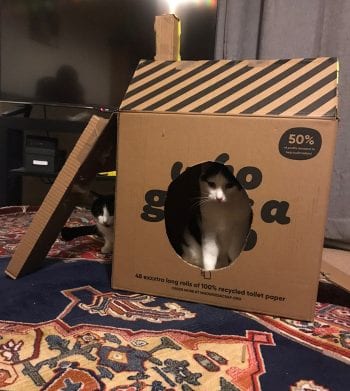1 Jul 2020
Cat owner and vet Jordan Sinclair offers some advice on keeping our feline friends happy despite us invading their space and interrupting their routines while on furlough or during lockdown.

“Do not confine cats that are used to going outdoors as this will definitely cause a lot of stress,” advises Jordan.
Since the start of lockdown, I’ve been seeing a lot of cats in practice – not that I’m complaining, as a self-confessed “crazy cat lady”.
A lot of these cases have been geriatric cats – many of which presented with chronic vomiting or reduced food intake (with various aetiologies). However, when we tore through our supply of T4 clips for the blood machine in two days, it occurred to me that this cannot simply be a coincidence.
With many people confined to their homes for larger proportions of the day than usual, they are inevitably noticing more about their pet’s habits than they normally would. I suspect many of these older patients have probably had ailments for quite a while that are now amplified because their owners are noticing just how many times their four-legged friends are at the water bowl or fail to keep their breakfast down.
Although this has added to our currently relentless workload, it is, overall, a positive thing that owners are paying more attention to their moggies. In 2017, only 65% of cats in the UK received a primary vaccination course – and not all of these will continue to have annual boosters. Consequently, many cats will see a vet only a handful of times in their lives, often only presenting with end-stage disease.
The result of owners being overly attentive at the moment is being able to pick up chronic conditions such as kidney disease much earlier than we may otherwise have done, which ultimately may result in better long-term prognoses.
However, geriatrics are not the only cats that have made an increased appearance on the consult list. We have also seen a number of cases with altered behaviour or cystitis. When having ruled everything else out, a lot of these cases seem to be stress or environment-related; that is, as a result of the owners being home more often and disturbing their peace.

One of my colleagues reported an owner requesting an appointment because they were so concerned about how much their cat sleeps during the day… which is probably a normal amount for that particular cat, with the owners only now being home to observe her sleeping routine.
So, how can we keep our cats happy during lockdown?
Cats are creatures of habit. Essentially, this means we should be allowing our cats to continue to do whatever it is they would be doing if their owners were out of the house. In most cases, this means just leaving them alone to go about their business as usual. That includes resisting the urge to stoke and fuss them all day, and giving them space.
If working from home, do this in another room to where the cat spends most of its time. This will also help keep you from getting distracted, too. If your cat (like mine) seems to be magnetised to an open laptop, don’t reward them with attention when they decide they can type better than you.
It is really important that children understand cats need some peace and do not constantly bother them. Ensure there are safe areas that cats can easily access, away from noise and small people that may pester them.
Some cats will develop behaviour changes if they are stressed, such as scratching furniture, urine spraying, overgrooming, becoming withdrawn or more aversive (hissing or lashing out if provoked, for example) and hiding more.
To reduce the chance of these happening, ensure you provide plenty of enrichment opportunities for your cat (vertical and horizontal scratching surfaces, toys and places to hide) and provide safe spaces at different heights for your cats – a lot will feel safer being up high (and potentially out of the reach of children).
Ensure plenty of litter trays are available in different rooms. The general rule is providing the same number of litter trays in the house as the total numbers of cats, plus one additional tray. These should be in quiet areas, away from where the cat would normally eat.
If your cats normally spend some time outdoors, they should have access to the outside as usual. Do not confine cats that are used to going outdoors as this will definitely cause a lot of stress. Provide water bowls in different rooms and feed them at the same time of day to maintain a routine.
Plug-in diffusers such as Feliway or Pet Remedy can also really help with stress-related behaviour.
Lots of other nutraceutical calming products exist but, ultimately, if cats are really stressed and not coping well with alterations to their routine because of lockdown, this may manifest in a medical problem such as cystitis or dermatitis – which will often require veterinary intervention.
Hopefully the majority of our feline friends are blissfully unaware of the chaos going on in the world around them and can spend their days with very little difference. I don’t think Oreo and Guinness are too bothered.